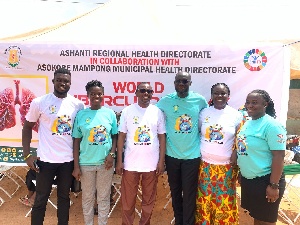- Home - News
- Elections 2024
- News Archive
- Crime & Punishment
- Politics
- Regional
- Editorial
- Health
- Ghanaians Abroad
- Tabloid
- Africa
- Religion
- Photo Archives
- Press Release
Health News of Tuesday, 25 March 2025
Source: www.ghanawebbers.com
TB detection targets drop in Ashanti Region as cases increase
Health authorities in the Ashanti Region are worried about tuberculosis (TB) detection. The region is not meeting its target for identifying TB cases. Recorded cases of TB are on the rise.
In 2023, health officials aimed to detect 4,000 cases. However, only 3,141 cases were found. Dr. Adomako Boateng, the Ashanti Regional Director for Health Services, explained the implications of this shortfall.
Undiagnosed individuals unknowingly spread TB within their communities. This leads to more infections and severe health issues. It can even result in deaths.
The Ashanti Regional Health Directorate marked World Tuberculosis (TB) Day on March 24. They collaborated with the Asokore Mampong Municipal Health Directorate for this event. The theme was “YES! We Can End TB: Commit, Invest, Deliver.” This highlights the need for dedication and funding to eliminate TB by 2030.
Dr. Boateng emphasized evaluating progress toward eradicating TB. He noted that World TB Day is a key moment to assess targets.
Over the past four years, TB cases in Ashanti Region have increased significantly. In 2021, there were 2,120 recorded cases. This rose to 2,866 in 2022 and reached 3,141 in 2023. In 2024, it further increased to 3,339 cases.
Dr. Boateng also pointed out pediatric TB's importance. It accounts for about 8 to 10 percent of total cases. In 2024, there were only 204 recorded pediatric TB cases when officials expected between 251 and 314.
This shortfall shows a need for better detection and treatment efforts for children with TB. Pediatric TB presents differently from adult TB; early detection is crucial.
He called for more investment and commitment to improve intervention strategies aligned with this year's World TB Day theme.
Gideon Okyere from ORUM Institute Ghana stressed involving private health facilities in detecting and managing TB. So far, they have trained 26 private facilities to identify cases and collect samples.
Okyere reassured the public that screening and treatment are free of charge. Financial constraints should not stop anyone from seeking help.
“From screening to treatment completion, there is no cost involved,” he said. He urged everyone to get tested since TB is curable but can be transmitted easily.
The event highlighted the urgent need for commitment and collective action against TB. Health officials reiterated that early detection is vital in preventing disease spread and reducing deaths related to it.
They encouraged people to utilize free screening services and support awareness efforts so no one remains undiagnosed or untreated.
As the Ashanti Region works towards eliminating TB, health authorities remain dedicated to strengthening interventions and increasing public awareness. By collaborating effectively, they aim to achieve their goal of ending TB by 2030.











